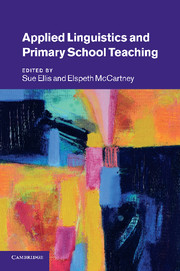Book contents
- Frontmatter
- Contents
- List of figures
- List of tables
- Notes on contributors
- Preface
- Editors' notes and conventions
- Introduction
- Part I Policy and diversity in the twenty-first-century primary school
- Part II The range and focus of applied linguistics research
- Introduction to Part II
- 6 Grammar for designers: how grammar supports the development of writing
- 7 The use of corpus-based approaches in children's knowledge about language
- 8 Words and pictures: towards a linguistic understanding of picture books and reading pedagogy
- 9 From storytellers to narrators: how can the history of reading help with understanding reading comprehension?
- 10 Talk about text: the discursive construction of what it means to be a reader
- 11 Why we need to know about more than phonics to teach English literacy
- 12 Understanding children's reading comprehension difficulties
- 13 Classroom discourse: the promise and complexity of dialogic practice
- 14 Pedagogy and bilingual pupils in primary schools: certainties from applied linguistics
- Part III Empowering teachers and teachers' use of knowledge
- References
- Index
14 - Pedagogy and bilingual pupils in primary schools: certainties from applied linguistics
Published online by Cambridge University Press: 26 April 2011
- Frontmatter
- Contents
- List of figures
- List of tables
- Notes on contributors
- Preface
- Editors' notes and conventions
- Introduction
- Part I Policy and diversity in the twenty-first-century primary school
- Part II The range and focus of applied linguistics research
- Introduction to Part II
- 6 Grammar for designers: how grammar supports the development of writing
- 7 The use of corpus-based approaches in children's knowledge about language
- 8 Words and pictures: towards a linguistic understanding of picture books and reading pedagogy
- 9 From storytellers to narrators: how can the history of reading help with understanding reading comprehension?
- 10 Talk about text: the discursive construction of what it means to be a reader
- 11 Why we need to know about more than phonics to teach English literacy
- 12 Understanding children's reading comprehension difficulties
- 13 Classroom discourse: the promise and complexity of dialogic practice
- 14 Pedagogy and bilingual pupils in primary schools: certainties from applied linguistics
- Part III Empowering teachers and teachers' use of knowledge
- References
- Index
Summary
Introduction
During the annual half-day session devoted to learning about English as an additional language (EAL) on a crowded initial teacher training curriculum at the University of Birmingham, one trainee teacher approached me at the end of my guest lecture. She wanted to check that she had understood my endorsement of her bilingualism in the primary school classroom. She wanted confirmation that she could and should use Urdu alongside her English. Unlike many of my responses to the complex questions students ask, I was able to give a clear unambiguous answer ‘Yes’. Using the linguistic resources of teachers and pupils in the endeavour of learning and teaching to engage and facilitate is to be endorsed and supported in our school classrooms. In this chapter, I draw on a body of research to consider how teacher and pupil languages and varieties of languages can serve as resources in the primary school classroom. I show how pupil and teacher bilingualism can be used in multilingual classrooms drawing on two different contexts. The first is a Gujarati complementary school in Leicester while the second is a Birmingham primary school. I make the argument that we should be encouraging code-switching as a pedagogic resource for teaching and learning and suggest that our initial and continuing teacher development programmes need to offer support and strategies to teachers to implement such an approach.
- Type
- Chapter
- Information
- Applied Linguistics and Primary School Teaching , pp. 186 - 198Publisher: Cambridge University PressPrint publication year: 2011
- 1
- Cited by



